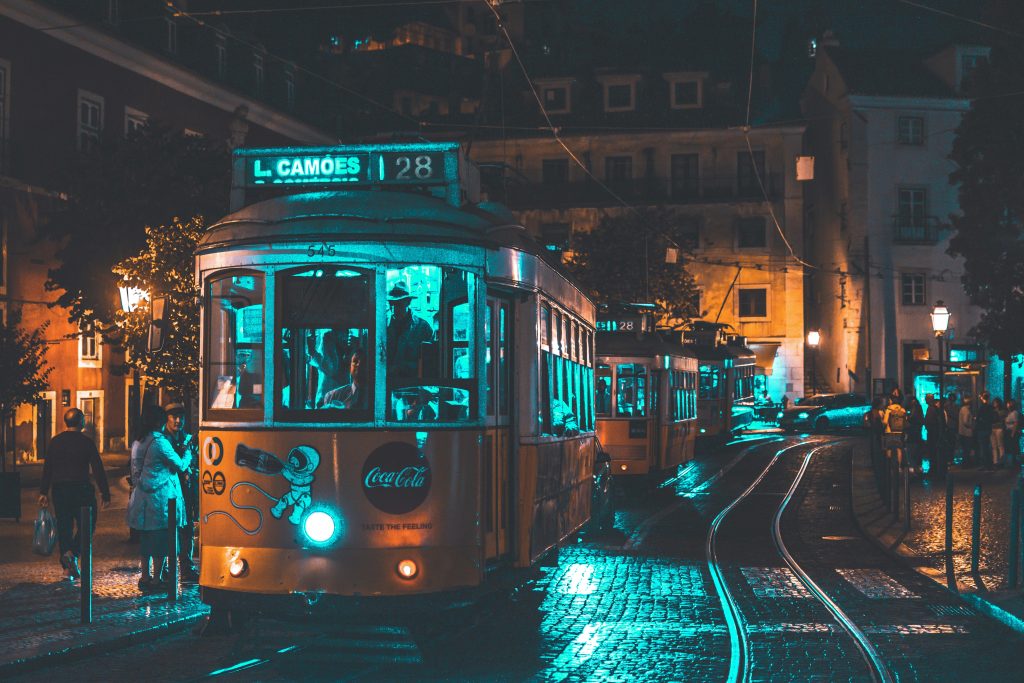
Country: Portugal
Lisbon, the capital of Portugal, is a captivating city known for its rich history, stunning architecture, and vibrant culture. Located along the Tagus River, Lisbon offers a mix of traditional and modern attractions, from the historic Belém Tower and the UNESCO-listed Jerónimos Monastery to the trendy neighborhoods of Alfama and Baixa. The city is famous for its colorful trams, charming cobblestone streets, and lively squares. Visitors can enjoy delicious Portuguese cuisine, including pastéis de nata and fresh seafood, while experiencing the city’s energetic atmosphere and breathtaking views. With its warm climate and rich cultural heritage, Lisbon is a must-visit destination.
Carnaval de Lisboa – February: Lisbon’s vibrant Carnaval brings colorful parades, dazzling costumes, and lively street performances across the city. Music, samba dancers, and themed floats create a festive atmosphere, with parties lasting late into the night. It’s a fantastic winter celebration that fills Lisbon with energy and joy.
Book Fair – May to June: This annual fair takes place in Eduardo VII Park, attracting book lovers with countless stalls, author signings, and literary events. Visitors can browse a wide selection of books, from Portuguese classics to international bestsellers, all in an outdoor setting. It’s a great place to experience Lisbon’s literary culture and meet local writers.
Festa de Santo António – June: Celebrating Lisbon’s patron saint, this festival features lively street parties, traditional fado music, and delicious grilled sardines. Alfama’s winding streets fill with decorations, dancing, and processions, while locals participate in mass weddings known as “casamentos de Santo António.” It’s Lisbon’s most iconic summer celebration, blending history, food, and fun.
Jazz em Agosto – August: This summer jazz event takes place at the Gulbenkian Foundation, hosting contemporary jazz musicians from around the world. Concerts range from experimental performances to traditional jazz styles, attracting music lovers to one of Lisbon’s most prestigious venues. It’s a perfect way to enjoy warm August nights with incredible live music.
Oceanarium – Year-round: One of the largest aquariums in Europe, the Oceanarium offers a fascinating look at marine life from around the world. Visitors can explore giant tanks filled with sharks, rays, and colorful fish, as well as exhibits on conservation and biodiversity. It’s an immersive experience for families and nature enthusiasts any time of the year.
Pastéis de Nata Baking Workshop – Year-round: Learn the art of making Portugal’s famous custard tarts in a hands-on baking workshop. Expert chefs guide participants through the process, from preparing the flaky pastry to achieving the perfect creamy filling. It’s a delicious way to connect with Lisbon’s culinary heritage and enjoy freshly made treats.
Rooftop Film Sessions – July to September: During the summer months, rooftop venues across the city transform into open-air cinemas. Visitors can watch classic films and new releases while enjoying panoramic views of Lisbon’s skyline. The combination of fresh air, great movies, and scenic settings makes for an unforgettable evening.
Wine Tasting – September to October: Autumn is the perfect time to explore Portugal’s wine culture through guided tastings and vineyard tours. Local sommeliers introduce visitors to a variety of regional wines, including famous Portuguese reds and refreshing vinho verde. It’s an excellent way to discover the rich flavors of Lisbon’s wine scene.
Doclisboa International Film Festival – October: This documentary film event showcases thought-provoking films from around the world, covering a range of cultural and social topics. Screenings take place in different theaters across Lisbon, attracting filmmakers, critics, and cinephiles. It’s a must-visit for film lovers seeking powerful storytelling and unique perspectives.
Natalis Christmas Market – December: Lisbon’s largest Christmas market offers festive shopping, seasonal treats, and a magical winter atmosphere. Visitors can browse handmade gifts, sample Portuguese holiday specialties, and enjoy entertainment like carol singing and ice skating. It’s the perfect way to experience the holiday spirit in Portugal’s capital.
Sintra Day Trip – March to November: A short train ride from Lisbon, Sintra’s fairy-tale palaces, lush gardens, and historic castles make for an unforgettable excursion. Visitors can explore the colorful Pena Palace, mysterious Quinta da Regaleira, and scenic Moorish Castle while enjoying breathtaking mountain views. It’s a must-do experience for history and nature lovers alike.
Half Marathon – March: This famous running event takes athletes across the 25 de Abril Bridge, offering spectacular views of the Tagus River. Participants from around the world compete in this well-organized race, which also includes a shorter fun run for casual runners. Whether running or cheering from the sidelines, it’s an exciting way to experience Lisbon’s sports culture.
Lisbon, the capital of Portugal, is a city with a rich and diverse history, but it is perhaps most famously known for its incredible rebuilding after the catastrophic earthquake of 1755. The story of Lisbon’s rise from the ashes is one of resilience, reconstruction, and cultural transformation. The earthquake of November 1, 1755, remains one of the most powerful in European history.
Lisbon, Portugal’s coastal capital, played a central role in the Age of Exploration, a period in the 15th and 16th centuries when European powers sought to chart the unknown world and expand their empires. During this time, Lisbon became the epicenter of maritime activity, a hub for sailors, traders, and explorers who set out to discover new lands and establish global trade routes. The Age of Exploration in Portugal is often associated with figures like Prince Henry the Navigator, Vasco da Gama, and Ferdinand Magellan, who embarked on voyages that would change the course of history.
Explore captivating tales and travel insights from our vibrant community of storytellers and adventurers.